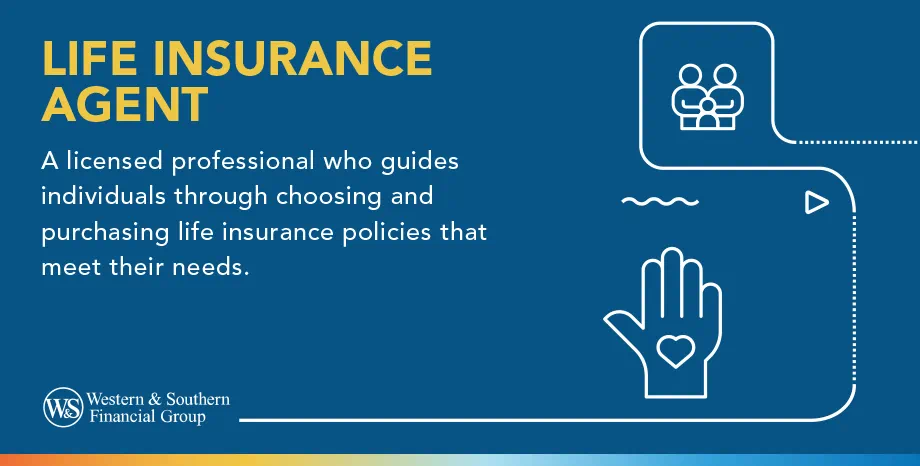

Key Takeaways
- A life insurance agent is a licensed professional who provides expert guidance on complex insurance products to match your specific financial needs.
- Agents perform a personalized needs assessment to ensure you get adequate coverage without overpaying, tailoring policies to your life situation.
- They simplify the entire application process, from handling paperwork to coordinating medical exams, ensuring a smooth and efficient experience.
- To find a trusted agent, get referrals, check professional associations, and interview several candidates.
- Always verify an agent’s qualifications by checking their state license and looking for advanced professional designations like CLU, ChFC, or CFP®.
What Is a Life Insurance Agent?
A life insurance agent is a licensed professional authorized to sell insurance policies on behalf of one or more insurance companies. These agents possess deep knowledge of policy structures, underwriting requirements, and coverage options, enabling them to match clients with appropriate protection based on individual circumstances and financial goals.
What Do Life Insurance Agents Do?
A life insurance agent can provide significant benefits when navigating the complexities of choosing the right life insurance to meet your needs. Here are several key advantages of working with a life insurance agent when purchasing coverage:
Expert Guidance on Various Products
Life insurance policies come in many forms, offering a range of options, including term life, whole life, and universal life, each with its own benefits and intricacies. A life insurance agent brings expert knowledge about these products and can explain each type's differences and potential advantages, helping you make an informed decision based on your needs, family situation, and financial goals.
Personalized Needs Assessment
One of the primary roles of a life insurance agent is to assess your individual needs based on factors like your financial situation, health, family obligations, and future goals. They can tailor recommendations that provide adequate coverage while fitting the cost into your budget. This personalized quote ensures you're not underinsured or overpaying for unnecessary coverage.
Assistance Through the Application Process
Agents assist in managing this life insurance process, including scheduling medical exams and ensuring that all the necessary paperwork is completed accurately, which can help avoid delays or coverage denials.
Ongoing Support and Policy Management
Life insurance needs can change over time due to changes in income, marital status, family size, and other factors. Life insurance agents offer ongoing customer service support and can review your policy periodically to suggest adjustments or updates to ensure that your coverage continues to meet your needs. They can also help with policy management tasks such as beneficiary changes, conversions, etc.
Advocacy and Claim Assistance
Having an agent can be invaluable in the event of a claim. Agents act as your advocate with the insurance company, helping to ensure that claims are processed efficiently and fairly. They can help submit paperwork and work to resolve any issues.
Finding the Right Life Insurance Agent
Finding a competent and reliable life insurance agent near you involves several steps to help ensure you partner with an insurance professional who understands your needs and offers appropriate solutions. Here's a practical approach to locating a life insurance agent in your area:
- Local Referrals: Start by asking family, friends, and coworkers if they can recommend a trustworthy life insurance agent in your vicinity. Referrals are particularly valuable because they come with insights into the agent's communication style, reliability, and effectiveness based on firsthand experiences.
- Online Searches: Use online resources to find local life insurance agents. Websites such as Google Reviews can provide listings and agents' reviews in your area. These platforms often include customer feedback, which can be invaluable in assessing an agent's reputation and professionalism.
- Check Professional Associations: Consider looking into agents who are members of professional associations in the insurance industry, such as the American Council of Life Insurers (ACLI) or local insurance agent associations. Membership in these organizations often requires adhering to professional standards and ethical practices, which can provide an additional layer of trust.
- Insurance Company Locators: Visit the websites of well-known insurance companies. Most have agent locator tools where you enter your ZIP code to find agents authorized to sell their products in your area. This can be a helpful way to find agents offering specific products you might be interested in. Use our insurance agent locator to find a licensed agent.
- Attend Local Seminars or Workshops: Agents and financial advisors often conduct seminars and workshops on financial planning and insurance topics for potential clients. Attending these events can provide an opportunity to meet agents in a no-pressure environment and gauge their expertise and interpersonal skills before committing to any services.
- Interview Potential Agents: Once you have a list of potential agents, arrange meetings with them to discuss your insurance needs and evaluate their expertise. Inquire about their experience, the types of insurance products they offer, and their approach to client relationships. This is also an excellent time to ask for client references.
- Evaluate Their Communication and Professionalism: During your initial consultations, assess how well the agent explains insurance options and responds to your questions. A good agent should be clear, transparent, and patient, ensuring you understand all your options without feeling pressured.
- Consider Their Accessibility: Choose an agent who is accessible and responsive. You want someone who will be available to answer your questions and assist with policy updates or claims as needed.
- Trust Your Instincts: Finally, trust your instincts when selecting an agent. You should feel comfortable and confident in their ability to effectively manage your life insurance needs.
By following these steps, you can find a life insurance agent who meets your specific requirements and provides the service and expertise necessary to help you secure your financial future effectively.
Essential Qualifications & Credentials
Professional competence varies significantly among life insurance agents. Recognizing key qualifications helps you identify truly qualified professionals.
Licensing Requirements
Every life insurance agent must hold valid state licensing. The National Association of Insurance Commissioners (NAIC) oversees state insurance regulation, ensuring agents meet minimum education and testing requirements.
Verify agent credentials through:
- State insurance department databases
- NAIC online verification tools
- Professional association membership directories
- Company websites and agent profiles
Professional Designations
Advanced certifications indicate deeper expertise and ongoing education commitment. Respected designations include:
Chartered Life Underwriter (CLU): Comprehensive life insurance and estate planning expertise requiring extensive coursework and experience.
Certified Financial Planner (CFP): Broad financial planning knowledge including insurance, investments, and retirement planning.
Life Underwriter Training Council Fellow (LUTCF): Specialized life insurance training focusing on practical application and ethics.
Chartered Financial Consultant (ChFC): Advanced financial planning education emphasizing insurance and investment coordination.
The Bottom Line
Choosing the right life insurance policy is essential to securing your family's financial future. With the support of a skilled life insurance agent, you may find the process easier to understand and navigate with more confidence. Contact a life insurance agent today to discover how you can benefit from their expertise and support.
Our life insurance agents are ready to help assess your needs. Request a Free Life Insurance Quote
Frequently Asked Questions
How do life insurance agents get paid?
Most life insurance agents don't charge direct fees to consumers. Instead, they receive commissions from insurance companies when you purchase policies. These commissions are built into policy premiums, so you typically won't pay extra for agent services. However, some agents offer fee-based consulting for an hourly rate, which can provide more objective advice.
Can I buy life insurance without an agent?
Yes, you can buy life insurance without an agent. Some companies offer simple term life insurance policies directly to consumers online. However, a life insurance agent can provide personalized guidance and expertise for complex life insurance needs or if you want to compare multiple options.
What are the types of life insurance agents?
Life insurance agents can be categorized into two main types:
- Captive Agents who represent and sell insurance for a single company.
- Independent Agents who work with multiple life insurance companies to offer numerous companies' products.
How do I verify that a life insurance agent is licensed?
Every state maintains an insurance department database where you can verify agent licensing. You can also check with the National Association of Insurance Commissioners (NAIC) or search your state's insurance department website. Always verify licensing before working with any insurance professional.
Sources
- State Insurance Department Directory – National Association of Insurance Commissioners (NAIC). https://content.naic.org/state-insurance-departments
- Designations – The American College of Financial Services. https://www.theamericancollege.edu/designations-degrees
- About CFP Certification – Certified Financial Planner Board of Standards, Inc. https://www.cfp.net/about-cfp-board


























